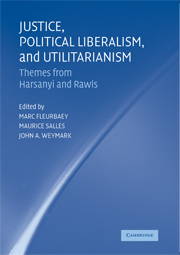Book contents
- Frontmatter
- Contents
- Preface
- List of Contributors
- 1 An Introduction to Justice, Political Liberalism, and Utilitarianism
- PART ONE THEMES FROM RAWLS
- 2 John Rawls's Theory of Justice: Some Critical Comments
- 3 Rawls, Responsibility, and Distributive Justice
- 4 Improving Our Ethical Beliefs
- PART TWO HARSANYI'S IMPARTIAL OBSERVER AND SOCIAL AGGREGATION THEOREMS
- PART THREE GOODNESS AND WELL-BEING
- PART FOUR SHARING THE GAINS FROM SOCIAL COOPERATION
- PART FIVE RIGHTS AND LIBERTIES
- Index
4 - Improving Our Ethical Beliefs
Published online by Cambridge University Press: 09 February 2010
- Frontmatter
- Contents
- Preface
- List of Contributors
- 1 An Introduction to Justice, Political Liberalism, and Utilitarianism
- PART ONE THEMES FROM RAWLS
- 2 John Rawls's Theory of Justice: Some Critical Comments
- 3 Rawls, Responsibility, and Distributive Justice
- 4 Improving Our Ethical Beliefs
- PART TWO HARSANYI'S IMPARTIAL OBSERVER AND SOCIAL AGGREGATION THEOREMS
- PART THREE GOODNESS AND WELL-BEING
- PART FOUR SHARING THE GAINS FROM SOCIAL COOPERATION
- PART FIVE RIGHTS AND LIBERTIES
- Index
Summary
I want to raise a subject associated with one of our two distinguished honorands, John Rawls. A proposal of his that has gained almost universal acceptance in the philosophical community is that the way to test and to strengthen ethical beliefs is to bring them into wide reflective equilibrium. It is not that that seems to me wrong. It is just that it has always seemed to me to say so very little. That is the thought I want to develop.
Piecemeal Appeal to Intuition
Among philosophers, the most common sort of criticism of our ethical standards nowadays is what can be called piecemeal appeal to intuition. We are all familiar with how it goes: It follows from your view that it would be all right to do such-and-such, but that's counterintuitive, so your view must be wrong.
Philosophers now pretty much agree that, as criticism, piecemeal appeal to intuition is weak, though, for lack of anything stronger, their belief has not had the revolutionary effect on their practice that one could reasonably expect to follow.
It is not that piecemeal appeal to intuition shows nothing. It is just that the doubts that it raises are not very strong. It may well be that some intuitions are as close to sound moral beliefs as we shall ever get. Others, however, clearly are not, and there are no internal marks distinguishing the first lot from the second. Intuitions, despite the misleading suggestion in their name of a special sort of perception into moral reality, are just beliefs.
- Type
- Chapter
- Information
- Justice, Political Liberalism, and UtilitarianismThemes from Harsanyi and Rawls, pp. 108 - 126Publisher: Cambridge University PressPrint publication year: 2008



